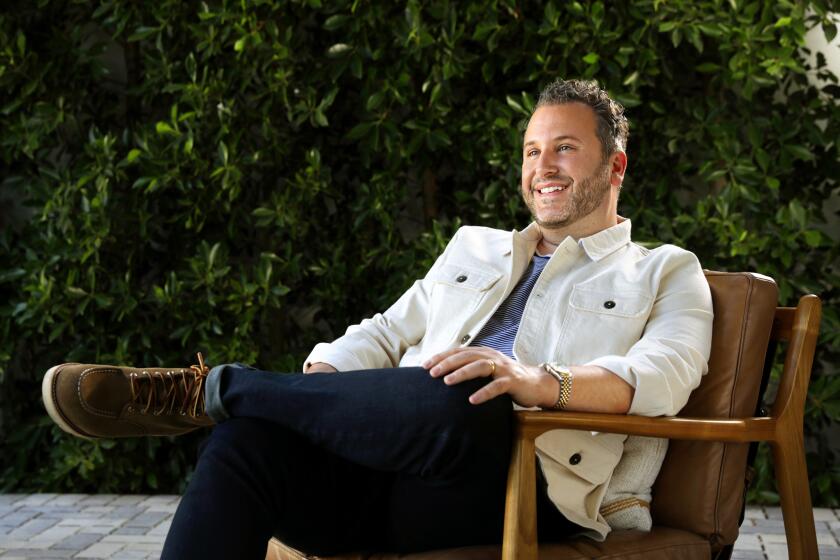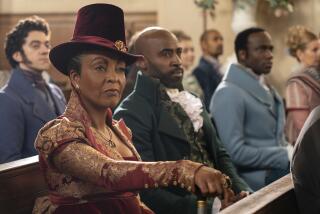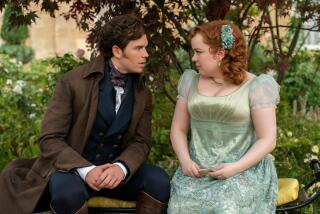Which season of ‘Bridgerton’ is better? We fight it out
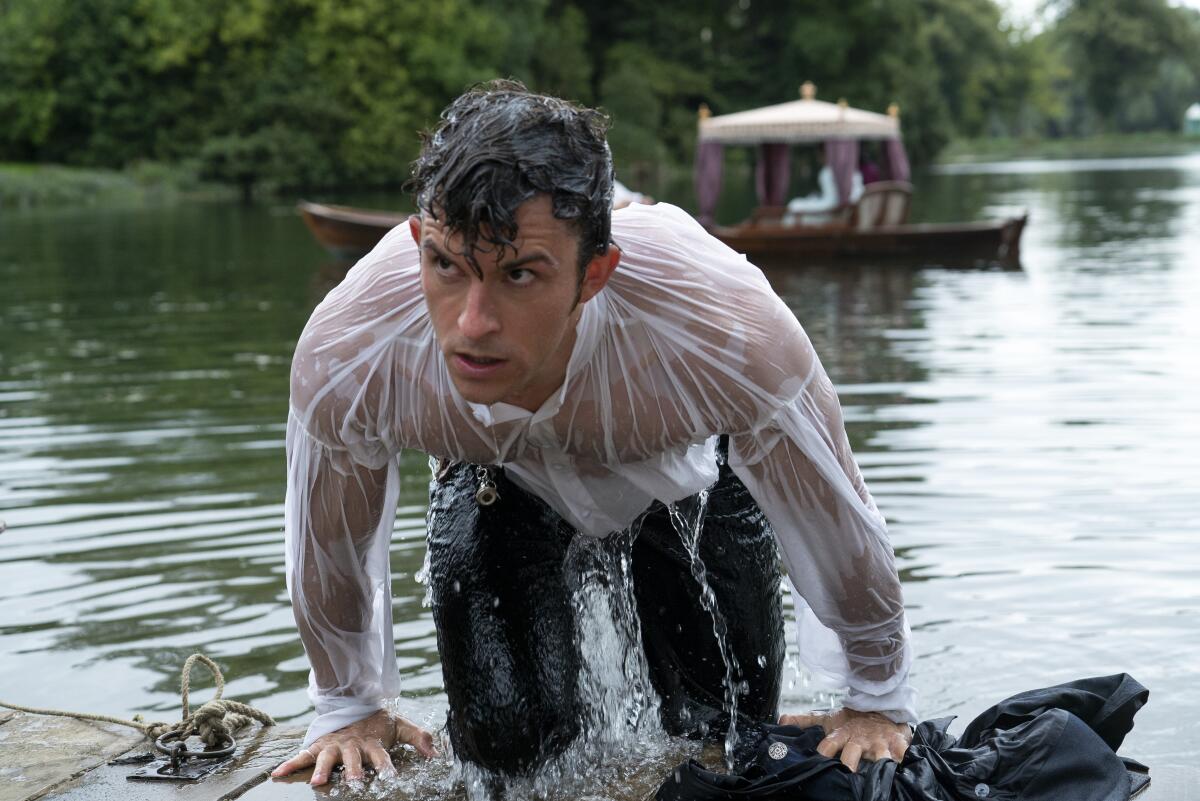
The following contains spoilers from Season 2 of “Bridgerton.”
The return of Netflix’s wildly popular “Bridgerton,” a sudsy romantic drama from executive producer Shonda Rhimes and creator Chris Van Dusen, is sure to set off plenty of debates: Who’s hotter, Jonathan Bailey or Regé-Jean Page? Who’s more ruthless, Queen Charlotte (Golda Rosheuvel) or Lady Danbury (Adjoa Andoh)? And which of our canny ingenues, Eloise (Claudia Jessie) or Penelope (Nicola Coughlan), is the “Bad Art Friend”?
But none is likely to be debated as fiercely as the relative merits of Season 1 and Season 2, which take contrasting approaches to sex, marriage, ambition and duty, among other major themes of the series. Staff writers Meredith Blake and Ashley Lee, who came down on either side of the divide, duke it out — see what we did there? — in time for Friday’s season premiere.
Chris Van Dusen breaks down Season 2 of the Netflix juggernaut, from a new, more chaste approach to the central romance to writing out Regé-Jean Page.
Blake: When “Bridgerton” arrived way back in late 2020, it became a massive breakout success for Netflix thanks largely to the charisma of its lead, Regé-Jean Page, its many, many sex scenes, and its not-entirely-unrealistic depiction of a young woman gradually figuring out how babies are made. It was always going to be hard for “Bridgerton” to top the bonkers lightning-in-a-bottle of Season 1, especially given Page’s departure from the series. But even though I came in with lowered expectations, I was still disappointed by the show’s sophomore turn.
To start with: I miss the Hot Duke. It seems obvious that the folks at Shondaland massively screwed up by not getting him back for Season 2, especially since his absence is barely explained and his supposedly devoted wife, Daphne, plays a crucial role in the season. He’s become the equivalent of Samantha Jones in “And Just Like That” — the character made conspicuous by his absence.
Ashley, I know you felt quite differently. Convince me I’m wrong!
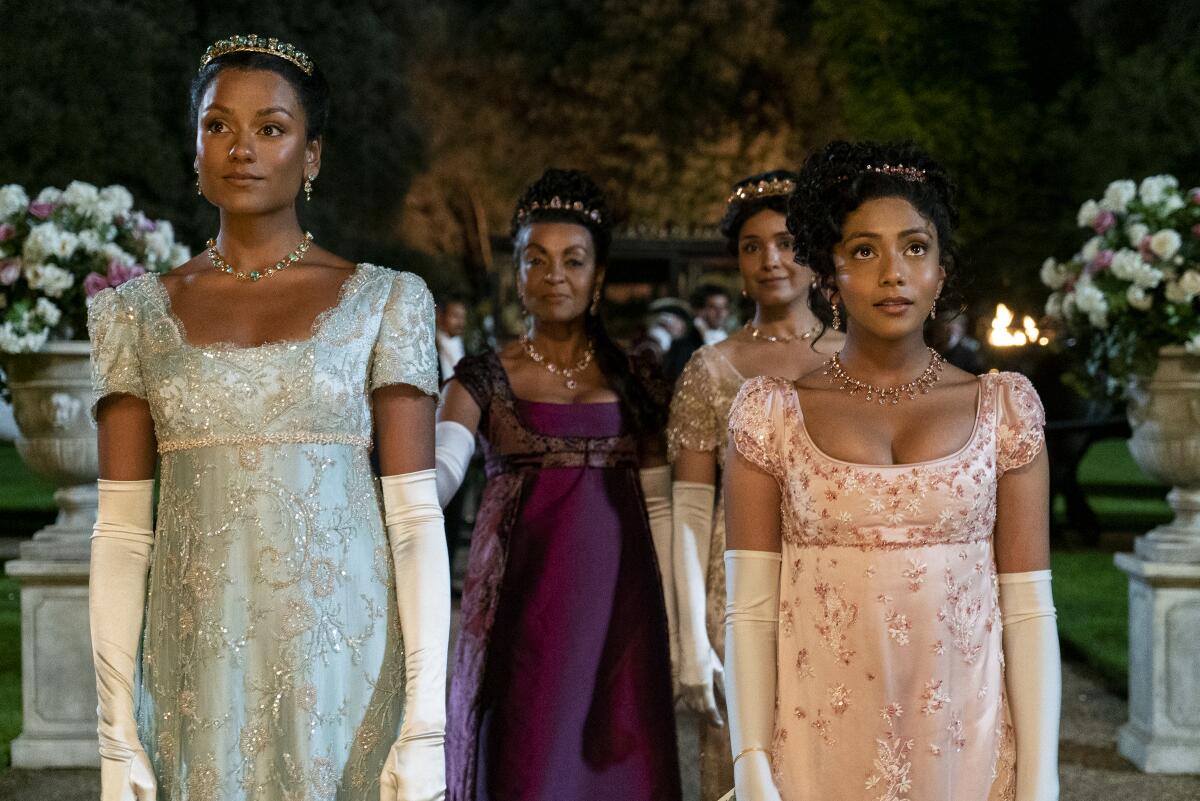
Lee: I’m the opposite! I missed the initial “Bridgerton” boat in 2020, and only binged the first season a few weeks ago when I was craving more low-stakes corset drama between episodes of HBO’s “The Gilded Age.” While it is an indisputable fact that Page is the human embodiment of sex appeal, I was beyond put off by the second half of the season, in which the main “obstacle” to overcome was Simon Basset’s objection to getting married or starting a family.
I get that it’s a series based on Julia Quinn’s books and still a period piece, but it’s also 2022 — if the Hot Duke doesn’t want to be Hot Duke with a wife and a kid, let him be! Plus, the way in which it all went down was pretty gross, and no amount of very, very well done sex scenes could make me look past that. I’m shocked that so many other viewers could, though part of me has to wonder if its massive reception was due to its release date, when many of us were sheltering in place for the holiday season and generally desperate for frivolity and excess.
Luckily, both those things are still hot commodities, which is why I enjoyed the second season. I totally looked past Anthony Bridgerton in Season 1 (it’s hard to claim heartthrob status when standing next to Page), but in learning more about him (that bee sting, yikes!), his appeal grew on me, as it did on Kate Sharma. When they finally kissed, I squealed. It was cute.
Historians help us sort through fact and fiction in executive producer Shonda Rhimes’ saucy Netflix drama about the 19th century English marriage market.
Blake: I was largely bored by the romance between Kate and Anthony, and the (roughly) 3,198 scenes in which they argued passionately, got in each other’s faces and nearly kissed while gazing into each other’s eyes.
I love a bit of repressed passion, don’t get me wrong! I know they were going for an Austen-esque slow burn — and they even paid homage to Colin Firth’s famous wet shirt scene — rather than the steaminess of Season 1, but I found it all quite tedious since it was clear from the first episode when they ran into each other on horseback where this was going to end up. Nearly every episode was a good 10 to 15 minutes too long (also a problem for the Shondaland series “Inventing Anna” and approximately every other drama on Netflix) and yet we never get a sense of why these two people simply must be together, except the conventions of the genre.
To me, Anthony’s professed lack of interest in marrying for love and unresolved daddy issues felt like a less interesting retread of emotional terrain we spent plenty of time on in Season 1. (Remember the Hot Duke and his daddy issues?) We didn’t even get a big wedding scene at the end, as if the writers of “Bridgerton” weren’t invested in this romance.
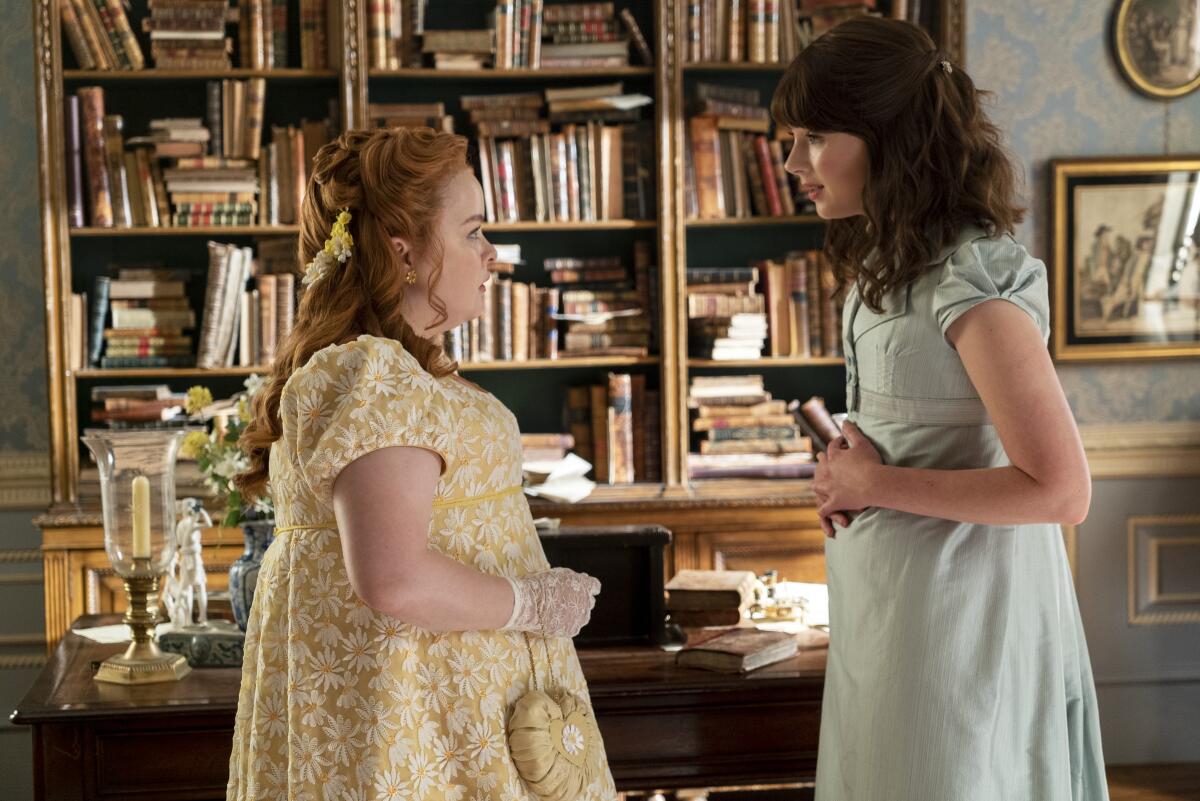
Lee: Ha! I didn’t mind the extra-long episodic length, since I also loved the arcs of the Sharma sisters, individually and together. I was immediately on board for the entire conceit of Kate, the older sister shunned for being from a previous marriage, guiding the younger Edwina to marry a man of nobility because of an inheritance clause. The words Kate finally heard from her mother were beautiful, and the dialogue between the siblings was more genuine than any back-and-forth from Season 1. And like Edwina, I found Anthony’s fierce defense of the family pretty attractive.
I agree with you — it’s very clear from the get-go that Anthony and Kate will be the two who end up together. But I was entertained while finding out how that would happen, especially since Edwina was crowned the season’s diamond. Like, I didn’t think they’d make it all the way to the altar!
So when Kate and Anthony collectively realized that choosing to be with each other meant choosing themselves, after a lifetime of sacrificing their own desires for the sake of their families, I shipped them more than I ever did Daphne and Simon. The two seasons are lust versus love, and for me, the latter will always win. I hope Edwina and that prince find their happy ending too.
In network TV, seeing a breakout star bolt from a hit show would be unusual. In the streaming world, it’s a different story.
Blake: It’s probably just the journalist/consummate gossip in me, but the only storyline that really kept me going was the ordeal involving Eloise and Penelope. Season 1 ended with the reveal that sweet, unassuming Penelope Featherington was actually Lady Whistledown, the writer behind the influential scandal sheet. I loved the idea that someone who was treated like a wallflower wielded such power behind the scenes.
Season 2 follows Penelope as she scrambles to keep her identity a secret, especially from her best friend, Eloise. (I loved the scenes of Nicola Coughlan sliding into her natural Irish accent.) In an ironic twist, Penelope writes about Eloise’s flirtation with the cute radical at the print shop — please, please bring this back for Season 3 — in order to save her from Queen Charlotte’s suspicions.
I find the friendship between these two women, who grew up in privilege yet feel like outsiders in the aristocratic marriage market, rather convincing. I’m curious to see how it all pans out next season — which, yes, I’ll watch. Sigh. I’m rooting for them to patch things up and start writing some feminist pamphlets or something.
Lee: At some point, I had guessed that Lady Whistledown would be Penelope, the big family’s relatively forgotten sibling who turns to writing as a way to claim influence and garner praise. I did love how the season framed her gossip column as a small business, which of course was revolutionary at the time, and how she teamed with dressmaker Genevieve Delacroix to boost both their bottom lines. Her decision to betray Eloise to save what she had built was pretty heartbreaking.
If the series follows the books, Season 3 will likely be adapted from “An Offer from a Gentleman,” which centers on Benedict Bridgerton in a “Cinderella”-like search for Sophie Beckett, a servant who sneaks into a masquerade ball and hits it off with the eligible bachelor.
What do you think, after what we’ve seen from Benedict in the first two seasons? I was as bummed as he was about the reveal that his coveted spot at the art school was all because of his brother’s donation and not purely his merit, but such is the life of a rich Bridgerton boy who is free to pursue art in the first place, right? I also thought his initial exposure to painting in Season 1 was building to an exploration of his sexuality, but this last batch of episodes proved otherwise.
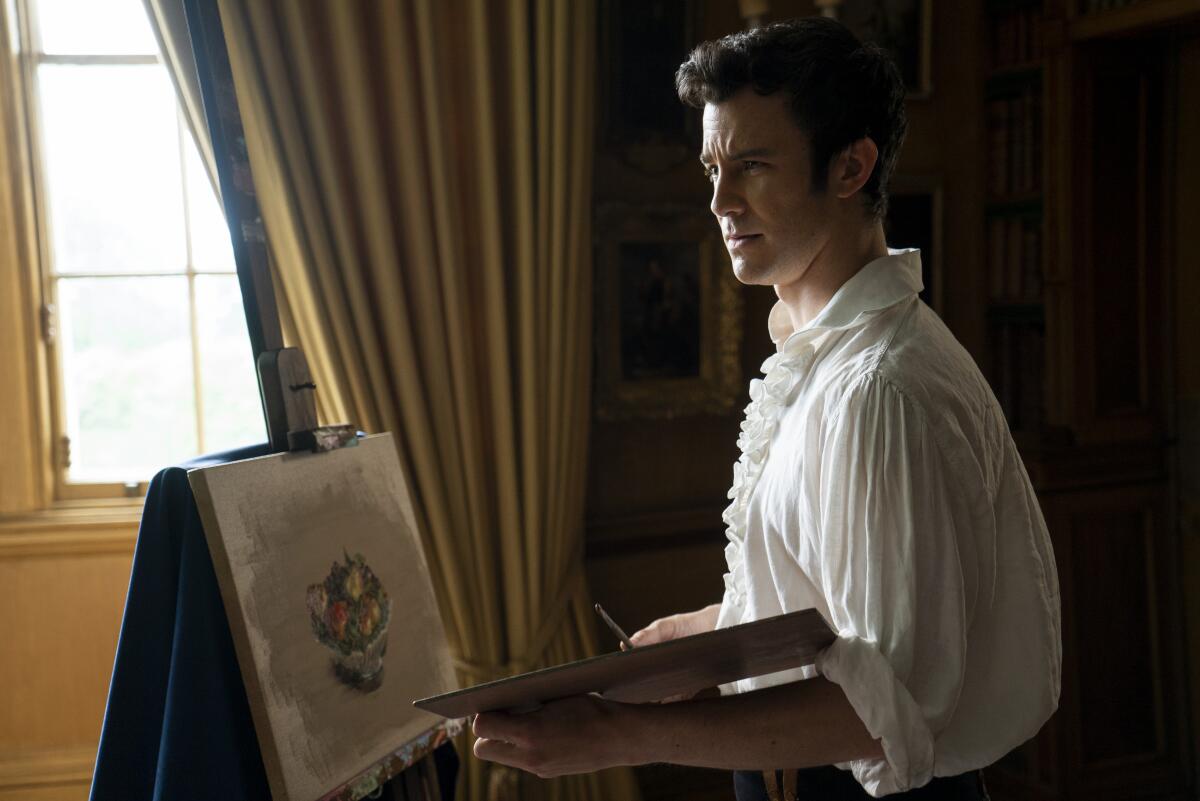
Blake: Given that I think of Benedict as “the one who paints,” and there are plenty of viewers who can’t even tell the Bridgerton boys apart, I am not sure how promising this is.
Mostly I’m eager to skip ahead and see how things turn out for Eloise, the Bridgerton I’m most invested in. I may even resort to reading the book instead. Drastic measures, indeed!
Lee: Here’s hoping “Bridgerton” gets renewed through Season 5, as the fifth book is all about Eloise! My interest in Season 3 will be heavily influenced by the casting of its leading lady, since I’m definitely one of those people who can’t tell the Bridgerton boys apart.
Otherwise, I’ll circle back with Season 4, since the fourth book is all about Colin and Lady Whistledown herself, Penelope. She knows what her readers want, so when it’s her turn to take center stage, “Bridgerton” better not disappoint.
‘Bridgerton’
Where: Netflix
When: Any time, season two available Friday, March 25
Rating: TV-MA (may be unsuitable for children under the age of 17)
More to Read
The complete guide to home viewing
Get Screen Gab for everything about the TV shows and streaming movies everyone’s talking about.
You may occasionally receive promotional content from the Los Angeles Times.
